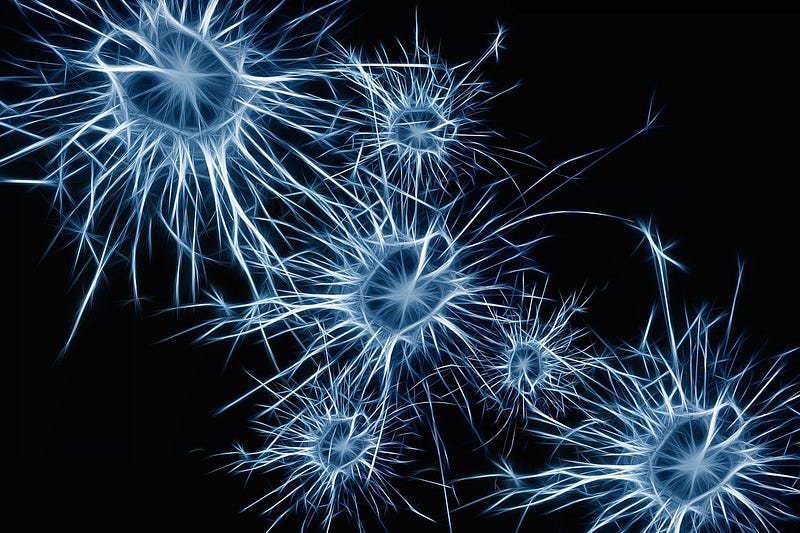The Dangers of Narcissistic Relationships: Understanding Neurochemistry
Written on
Understanding the Impact of Neurochemicals
People are always in search of something to uplift their spirits, and it's understandable given the chaos surrounding us. The anxiety can be overwhelming, especially when entangled in a toxic relationship with someone with Narcissistic Personality Disorder (NPD). It’s astonishing how much a person can endure and still remain upright.
The real threat isn't a pandemic, a faltering economy, or civil unrest—it's the neurochemicals that flood our brains and bodies. As you sift through your thoughts, trying to comprehend why a narcissist has left you feeling mentally exhausted, the answer may lie within your own hormones and neurotransmitters. These chemicals are integral to our complex systems, and when manipulated, they can lead to harmful reactions stemming from conditioning, brainwashing, and intermittent reinforcement by the narcissist.
Just a small taste of that “narc love,” a fleeting moment of relief amidst life's challenges—what harm could it do? Unfortunately, that's a misconception. Narcissists wield potent tools of seduction to ensnare us, and many find themselves teetering on the brink of addiction, drawn to the intoxicating dopamine provided by the narcissist, which makes even the most egregious behaviors seem tolerable.
Neurochemicals at Play
To begin with, testosterone plays a significant role in shaping behaviors that influence societal structures. While it has historically supported a patriarchal system that was meant to be mutually beneficial, it often becomes a restrictive paradigm for women. This hormone is both empowering and aggressive, present in varying levels across all humans.
Next, consider oxytocin, a peptide hormone produced in the hypothalamus and released into the bloodstream by the pituitary gland. It is vital for childbirth, orgasm, and feelings of love, earning it titles like “the love hormone.” It facilitates pair bonding and is crucial for empathy, making it an essential component of social interactions. In abusive dynamics, the narcissist often infantilizes their partner by stimulating oxytocin levels, perpetuating dependency.
In our contemporary world, characterized by chaos and despair, dopamine has taken center stage. Unlike previous generations, who were influenced by other neurochemicals, today's culture thrives on this neurotransmitter. Dopamine, a reward chemical, drives pleasure-seeking behavior, leading to a society marked by narcissism, hedonism, and selfishness. This shift has serious implications, potentially leading us toward destructive outcomes.
Beyond these primary agents, other hormones and neurotransmitters also influence our well-being. For instance, serotonin, which helps regulate mood and manage anxiety, is crucial for recovery from emotional abuse. Endorphins and endocannabinoids play roles in pain regulation and overall homeostasis.
Cortisol, known as the stress hormone, triggers our fight-or-flight response when faced with perceived threats. Living with a narcissist can elevate cortisol levels, leading to inflammation and various health issues. Chronic stress can cause fatigue and further health complications.
The Consequences of Narcissistic Abuse
The brain adapts to these neurochemical changes, which can result in trauma and even brain damage from relationships with narcissists. Many individuals may experience adrenal fatigue or autoimmune diseases due to sustained stress and emotional turmoil.
Experts emphasize that narcissistic abuse can have devastating effects on health. Dr. Ramani notes that such relationships exacerbate stress, leading to serious health consequences. Danish Bashir describes how the unpredictable nature of narcissists keeps partners in a constant state of survival, altering their perception and brain function.
Caroline Strawson suggests that understanding the root causes of our physical and emotional experiences is critical. She highlights that narcissists can trigger deep-seated wounds, compelling us to react in ways that can perpetuate our suffering.
Ultimately, the evidence is clear: narcissistic abuse can lead to serious physical and mental health issues. Escaping such relationships may require years of recovery, and some may never fully regain their health.
If you find yourself contemplating a relationship with a narcissist, heed this warning: they are like a consuming void, a trap that can drain your essence and render you powerless. Many before you have learned this the hard way, and the message is unanimous—do not underestimate the destructive potential of these individuals.
If you feel that instinct to flee but choose to ignore it, you may find yourself regretting that decision as the days pass. Trust those who have been through this; it’s not worth the risk.

Narcissists' Biggest Fear: Emotional Manipulation
This video explores the fears of narcissists and how they manipulate emotions to maintain control over their victims.
The Narcissist's Control Over Your Mind
In this video, experts discuss the psychological tactics used by narcissists to dominate your thoughts and emotions, highlighting the brain's vulnerability.
For further insights and resources on understanding narcissism and healing, visit my website at www.narctroopers.com.